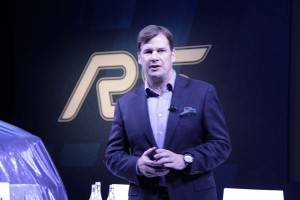
Ford's Jim Farley said the company is deep in talks with Volkswagen AG, but said there are plenty of small details that need to be worked out.
Ford Motor Co. is moving towards signing a series of new projects pairing it with Volkswagen AG, the first of those deals possibly being announced as early as next week. But a senior source tells TheDetroitBureau.com that final details haven’t yet been approved by the two automakers, something that could hold back a formal announcement.
And, with a variety of different projects now being negotiated, the new partners could spread out any news over a period of “weeks and months,” according to Jim Farley, Ford’s president of Global Markets.
The tie-up with Volkswagen is not expected to involve any equity swapping, sources close to the talks emphasize, but the eventual relationship is likely to be significant. If the key projects now under discussion prove fruitful they could range from joint development of commercial vehicles, electrified vehicles and other products to global marketing alliances that would take advantage of the strengths of each company.
Ford, for example, is a major player in North America, where VW is weak, while it’s the opposite in China, Europe and Latin America, where Volkswagen plays a dominant role.
(Ford and VW ready to announce new partnership. Click Here for the story.)
It wouldn’t be the first time the two companies have worked together. They’ve partnered, throughout the years, in a variety of ways, including the development and production of minivans jointly sold as the VW Sharan and Ford Galaxy.
But not all of their past efforts have gone well.
In the 1980s, they pooled resources in the then-struggling Brazilian and Argentine markets. But as the region recovered VW decided to abandon the joint venture, AutoLatina. Because of the way things had shifted in South America’s two largest markets, Ford came out of the deal in a weak position and has never really recovered.
Nonetheless, with Ford’s Latin American operations struggling, few would be surprised if some venture like AutoLatina were established again.
That said, Farley told TheDetroitBureau.com that Ford has “a lot of institutional memory” and will make sure that any new deals avoid the same traps and pitfalls of the past. Key will be finding “the right products,” he said, adding that Ford will “have to protect its brands. Balance,” he added, “is really very important.”
The tie-up with VW would come at a critical time for Ford which has been moving to slash thousands of jobs – though, unlike rival General Motors, most of the cuts are coming abroad. A key goal, said Farley, is becoming more efficient by trimming corporate bureaucracy.
Ford also is shifting its product strategy away from passenger cars to focus more on SUVs, pickups and other light trucks. But Farley suggested that reports that it will kill off virtually all sedans and coupes may be overstated. With future products that fall into the “crossover-utility” category, the description is so broad that “some may say (a new product) is a sedan, others a utility vehicle.”
(Click Here to see more about Ford’s discussions with Volkswagen.)
In the period leading up to the great automotive recession, with Alan Mullaly as CEO, Ford moved to shed European brands like Volvo and Jaguar, as well as walking away from a long-standing relationship with Japan’s Mazda. Under new chief executive Jim Hackett, however, the company seems more open to partnering — and not only with Volkswagen.
The U.S. automaker has been developing a series of ventures pairing it with Mahindra & Mahindra, one of the largest automotive manufacturers in the growing Indian market. They announced their first strategic partnership in 2017 and followed that with five Memorandums of Understanding, or MoUs, in March 2018. Two additional memoranda were inked last October, exploring options to share powertrains and work on connected car technologies.
For his part, Farley on Wednesday described Mahindra as “an extra fit company,” with “real capabilities” in such areas as customer relations and “futuring.”
Farley left open the possibility of adding still more ventures with Mahindra, though he declined to say whether Ford would consider the possibility of helping the Indian automaker add passenger vehicle production in the U.S.
(To see more about Ford being transparent about its turnaround plans, Click Here.)
Mahindra clearly has its eye on the American market. It recently began building a small off-road vehicle at a new plant in the Detroit suburb of Auburn Hills. And, during a November 2017 ceremony at the plant, Mahindra Group Chairman Anand Mahindra told reporters it would be “a very logical step after that” to add an on-road model.
